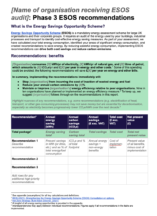The Energy Savings Opportunity Scheme (ESOS), which is administered by the Environment Agency and was launched in 2014, requires large businesses/groups in the UK to carry out an energy audit of their buildings, industrial processes and transport at least once every 4 years to identify opportunities for energy efficiency.
A 2020 Post-Implementation Review (PIR) found that ESOS led many organisations to carry out energy audits or look at significant areas of energy use for the first time. However it also highlighted areas where the scheme could be strengthened. Most notably, organisations do not always act upon the energy savings opportunities that lead assessors identify.
Following the PIR, BEIS issued a consultation on strengthening ESOS. This included a proposal to provide a recommendations template to enable higher quality and more consistent presentation of recommendations to organisations, therefore encouraging their take-up.
BIT and the Energy Systems Catapult (ESC) together explored how behavioural insights could be used to develop the ESOS recommendations template.
What we did
First, we co-created a draft recommendations template with BEIS, incorporating their subject matter expertise and behavioural science principles.
Then we conducted qualitative interviews with a sample of ESOS lead assessors and representatives of organisations who meet ESOS criteria. The purpose of these interviews was to explore barriers and enablers for implementing recommendations, and obtain feedback on the draft template.
We then facilitated two workshops with the same representatives to further iterate the template design.
Throughout this process, we incorporated ideas and insights from participants and applied behavioural science principles to develop a final proposed recommendations template.
Download the full report here
Behavioural science elements of the template we developed
- Framing: Our template prompts assessors to tailor the overall narrative to each organisation’s motivations, including prompts to link ESOS to organisations’ decarbonisation goals. However, we kept the template focused on energy savings primarily, given this is still the focus of the ESOS programme.
- Highlighting positive social norms: Our behaviour tends to be highly influenced by what others are doing. The template therefore draws attention to the fact that a great majority or organisations have planned or implemented energy efficiency measures.
- Subtly using loss aversion to drive behaviour change: Losses loom larger than gains. We therefore highlight the financial cost of inaction (i.e. savings that aren’t being realised) by not implementing the recommendation. Some organisations and assessors disliked the idea of framing benefits as ‘losses’ if recommendations were not taken up. However, ‘costs of inaction’ was seen as an appropriate, clear alternative phrase.
- Prompts to assessors to enhance organisations’ accountability for recommendations and implementation planning: Sections of the template nudge organisations to create a monitoring schedule for each recommendation to maintain progress; list next steps, risks and mitigations, and constraints (to start the important process of thinking through these thorny issues); and take stock of progress since the previous audit.
- Making it easy for assessors: We included instructional prompts and soft defaults in the template to make it clear and as self-explanatory as possible for assessors to complete.
Next steps
BEIS published a response to its consultation on strengthening ESOS on 28 July, in which it confirmed a decision to take forward the proposed recommendations template, and to work with stakeholders on developing accompanying guidance for the template.







